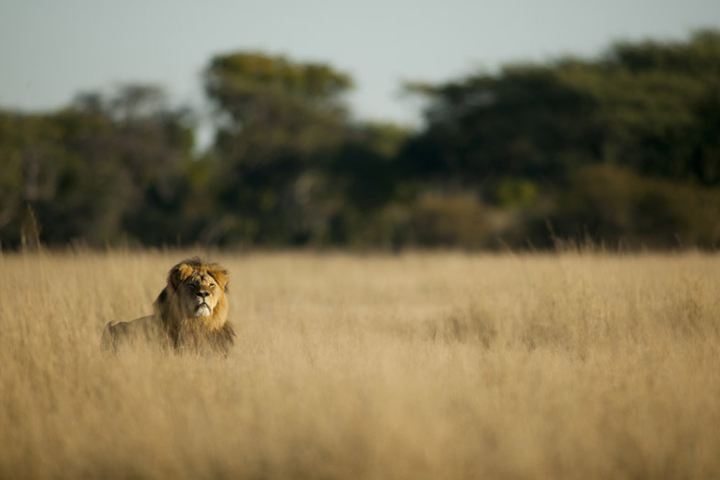Two American airlines bowed to public outrage over the killing of Cecil the lion and will now ban the shipment of hunting trophies of lions and other threatened or vulnerable animals.

Delta Airlines led the way Monday in announcing it would no longer allow trophies to be shipped in its cargo.
“Effective immediately, Delta will officially ban shipment of all lion, leopard, elephant, rhinoceros and buffalo trophies worldwide as freight,” Delta said in a statement Monday.
By late Monday evening, American Airlines announced on Twitter that it was following suit — despite not offering flights to or from destinations in Africa.
READ MORE: U.S. hunter sparks outrage after posting photo with dead giraffe in South Africa
Nearly 400,000 people signed an online petition demanding Delta Airlines stop the transport trophies of Africa’s so-called “Big Five” animals.
WATCH: Images of endangered species light up the Empire State Building
The “Big Five” refers to lions, elephants, rhinoceroses, leopards and Cape buffalos — the “most dangerous animals to hunt on foot.”
Delta and American Airlines join other airlines — including British Airways, Lufthansa and Emirates — in banning the transport of “Big Five” animal trophies as cargo.
The Change.org petition specifically targeted Delta Airlines because it is “the only U.S. carrier with direct service to South Africa” and is “in a key position to protect” threatened and vulnerable animals.
“By refusing to play a role in the wildlife trafficking supply chain, Delta Air Lines can demonstrate the strong and ethical leadership that has made it such a successful and respected company,” the petition, addressed to Delta Airlines CEO Richard Anderson and other executives, reads.
Although the petition to Delta was posted on Change.org more than three months ago, calls for such a ban grew in the wake of last month’s killing of the beloved lion, known as Cecil, in Zimbabwe. The lion was a favourite of tourists to Hwange National Park and was tracked as a part of a study out of Oxford University.
American dentist Walter Palmer reportedly paid $50,000 for a permit to hunt a lion in Zimbabwe, but Cecil was not hunted legally.
READ MORE: Zimbabwe announces hunting restrictions in area where Cecil the lion was killed
The 13-year-old lion was lured out of the national park, where lion hunting is not permitted, shot with an arrow and finally shot to death with a gun 40 hours later. Conservation workers later found his skinned and decapitated carcass.
WATCH: Hunting community goes on the attack following worldwide outrage over Cecil’s death
He is now being investigated by Zimbabwean and U.S. authorities; Zimbabwean officials are also calling for Palmer to be extradited.
Palmer, has been in hiding since it was revealed he was the hunter responsible for Cecil’s death, is an avid big game hunter, who has posted photos online of previous kills — including a rhinoceros, a lion and a leopard.
READ MORE: Zimbabwe accuses 2nd American of illegally hunting lion
Big game and trophy hunting is a big business in countries such as Zimbabwe and South Africa.
Delta said in its statement it had allowed the transport of Big Five trophies “in absolute compliance with all government regulations regarding protected species.”
South Africa Airways, however, recently took a step in the opposite direction, announcing July 23 it had “reversed” its embargo on the shipping of rhinoceros, elephant, tiger and lion trophies on its cargo carriers.
“As a responsible air transport service provider, we make an effort to ensure that our business is in harmony with government policy, compliant with international protocols and that the operational decisions we make must advance the interests of the company. Embargoes are placed occasionally influenced by circumstance at the time. These can also be lifted when situations change or improve,” South African Airways spokesperson Tlali Tlali said in a statement.
South Africa Airways put the embargo in place in April after “incidents of false declarations and submission of falsified documents for the shipment of some hunting trophies.”


Comments